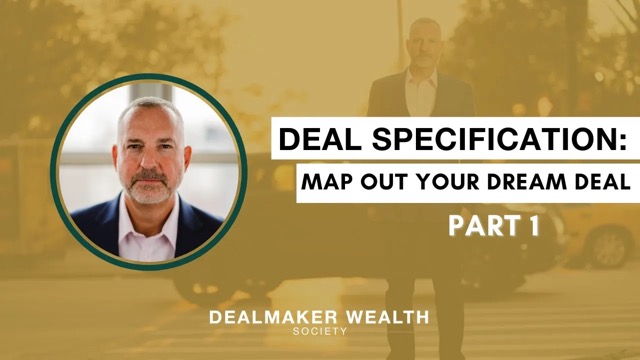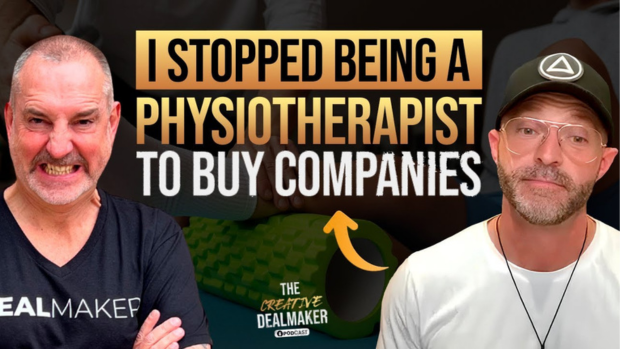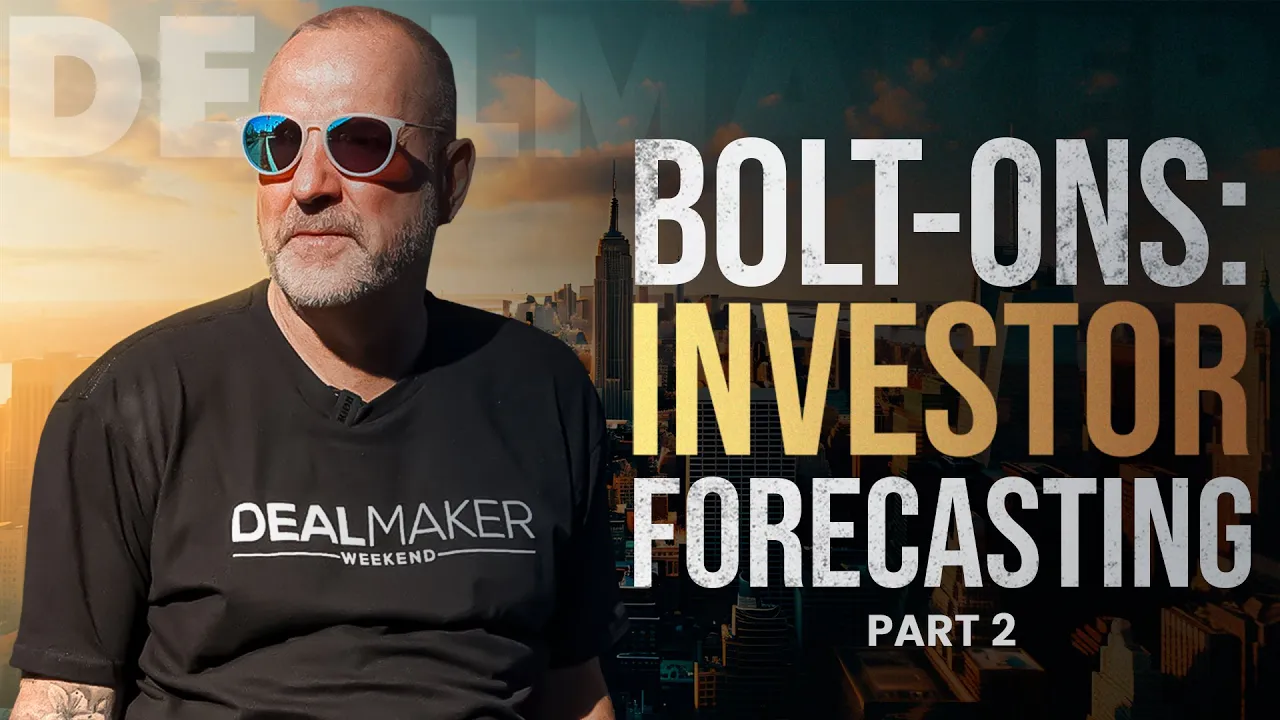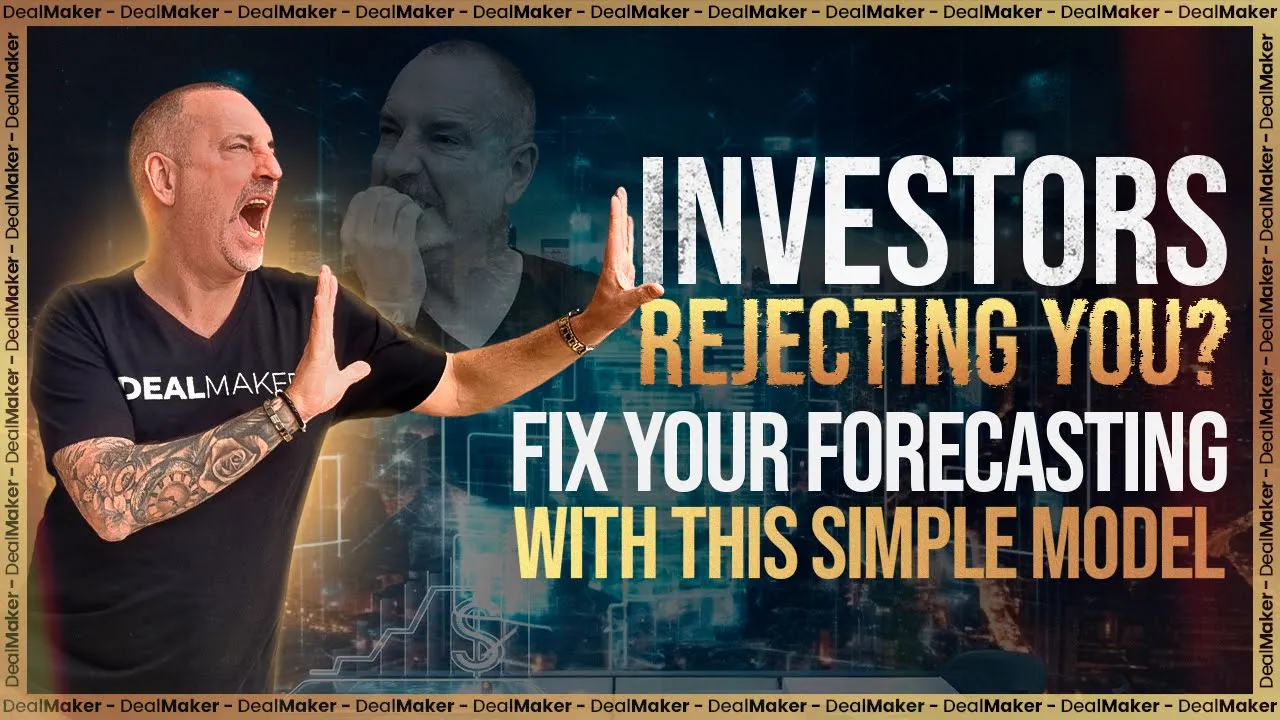Deal Specification: How to map out your dream deal specifics
Deal Specification: How to map out your dream deal specifics
In this detailed and beginner-friendly video, Carl Allen kicks off his “Deal Specification” training by helping viewers define exactly what kind of business they should acquire—based on lifestyle, location, experience, and passion. Whether you’re buying your first business or expanding an existing one, Carl explains how to structure your Dream Deal Specification (DDS) to match your ideal work-life balance, preferred role, and transferable skills. With over 3 million businesses available for sale and countless others quietly open to offers, having a clear yet flexible DDS is critical to finding the right opportunity and avoiding wasted time on misaligned deals.
Carl also walks through different dealmaker profiles, including owner-operators, strategic investors, and those looking to buy for immigration or remote ownership. He outlines practical examples of clients running businesses across states—or even continents—while maintaining full-time jobs or spending time with family. This video is the foundation of the acquisition journey, leading into a complete step-by-step system and real-world strategies to buy a profitable business using none of your own cash. Whether you’re targeting your dream location or industry, this training gives you the clarity and confidence to move forward with purpose.
Full Transcript:
Welcome to this YouTube channel on how to buy businesses no cash down. I’m Karl Allen, and I’ve been buying businesses for almost twenty five years, more than two hundred and fifty deals in seventeen countries.
This playlist is all about deal specification.
So what type of business do you want to buy? The sector, location, the size of the deal, your desired role in the business, and how you bring your passion, your business skills, and experiences to bear. Here’s the next video in the sequence. There are five in total.
Welcome back. This is the very start of the formal training. So by now, you should have completed all the orientation training and also watched the introductory video to week one so you know what this week’s all about. Now the first video for you this week is to fully map out in detail the dream deal specification or DDS.
Now you will have seen from the free webinar or training videos that the DDS is the first step in the ten step process. I can’t emphasize how important this step is. It’s all about focusing you on what type of business you want to acquire and why you want to acquire it, and then what you will do with it once you own it. You can be focused as you want for this step.
Now if you search business for sale in Google, it’ll return nine hundred and forty seven million search results.
Now I’m not saying there are nine hundred and forty seven million businesses for sale, but there are a lot. There’s more than three million businesses for sale in the USA, UK, and Australia alone. And more than ninety five percent of these are small and medium businesses or with less than twenty million dollars in annual sales revenues, which is our target market. Now I know from experience that a typical business broker will only sell eight percent of the businesses on their books in the first twelve months, and seventy five percent of those businesses don’t ever get sold. There are literally millions of businesses available for sale publicly, and many more are for sale in the mind of the owner without the business yet advertised on the market.
So we need to break down the specification into two types. In this video, it’s all about individuals or groups of individuals who don’t have a business at the moment, and that this deal will represent the first business acquisition.
The specification is all about creating the right work life balance and role mapped to your skills, your passion, and your experiences in your career thus far.
And the second video that will follow this focuses in on existing business owners. Now this set of criteria is very different, and it’s all about the cross selling, taking costs out of a combined operation, and the addition of new customers, products, services, and employees.
If you are acquiring your first business, I still want you to watch the second part of this video as it will give you good insights as to what you can do after you acquire your first business. As we will see throughout this journey, you can originate multiple opportunities, and you don’t need to stop after the first deal. You can then bolt other businesses into your first. So this section will give you a lot of insight into how this works. Now I do cover bolt on acquisitions in lots and lots of detail in week fourteen.
That being said, let’s start with the individual or team of individuals. Some of this is very relevant for the existing business owner as well. Now we’re going to cover this process in five ways. First, we’ll examine the work life balance.
How much do you want to work in your new business? Next, we’ll look at role. Do you want to be there every day as the general manager or be more like a chairman and do the strategic work, leaving a team to run the business day to day for you? Next, it’s expertise, and we break this down into three parts.
Skills, what are you good at? Is it operations, sales, finance, marketing, etcetera? We also look at sector knowledge. What sectors do you know well enough to own a business inside of them?
And finally, your business experiences. What has your career taught you so far? What lessons have you learned and lessons that you can apply to your new venture? Do you love, say, the engineering sector, but hate the aerospace elements of that?
It’s important that you bring all of your existing experiences and beliefs to bear on this decision. And in point five, we get into passion. Now it’s really important that you go into a sector and acquire a business that you can be passionate about. Because earning a business, whilst it’s really, really fun and massively rewarding, it can also be challenging.
Life always throws you curve balls. And if you’re truly passionate about what you’re doing, it gives you the strength and resolve to overcome any problems that you may encounter.
Now for me, the magic bullet in this process is finding the right expertise plus passion combination, and you’re gonna hear me say that an awful lot. If you’re really passionate about something and also have expertise in that area, then that’s the winning formula.
So before we get into detail, there are two schools of thought for your focus, and I want to talk them through with you. The the more opportunities you originate, the better the odds are of you completing a cash free deal. I’ve worked with clients that have created a very, very laser targeted specification that was very, very specific and ignored lots of multiple opportunities that came around. They were a good fit, but they weren’t a perfect fit and they were cast aside. That’s fine as long as you can originate a minimum of five opportunities, and that’s what weeks two and three is all about. Now the filtering process for both the size of business and the reason to sell are very important. But my advice is, for now, just keep your mind open to some variations to what you determine is your absolutely perfect business specification.
And on the other hand, your net shouldn’t be cast too wide. Otherwise, you will have too many opportunities to filter, analyze, and negotiate. Imagine you’re buying a house. You wouldn’t want to consider every house available within a ten mile radius from where you live. There has to be some criteria, location to schools, the neighborhood, the size of the house, the number of rooms, the parking, etcetera. Conversely, you wouldn’t want to look at a house that is exactly four thousand two hundred and fourteen square feet and has a forty five point four yard driveway.
It’s exactly the same in acquiring a business. You need a good specification, but the ability to be semi flexible. All of this will make sense in the next few weeks as you start originating opportunities and then match them to this DDS.
Now one caveat to this point is if you already know the business that you want to acquire and that you’ve become a business giveaway machine owner to learn how to acquire it without spending any of your own capital. You may have noticed in the eleven questions from week zero that I was asking about, you know, do you know a business already that you want to buy?
It could be that you work for that business already, and the owner or the owners are prepared to let you have it. That’s called an MBO, a management buyout. Or you may have worked there in the past, and you’ve kept in touch with the owner who’s now approached you to take it off his or her hands. The flip side to the MBO is the MBI, and that’s called a management buy in. So you know the business, but you haven’t worked there. Now the process is exactly the same. If there are more than one of you going through this process, then that’s called a BIMBO, a b I m b o, or a buy in, management buyout, if one of you is in the business and the other is not.
So if you do have a business that you definitely want to buy and you’ve approached it or you’ve had discussions, price this training, I urge you to still do the DDS exercise and originate some other opportunities. Now why is this important? Well, it’s important for two reasons. First, I want to give you some some leverage to play other businesses off against the owners of that chosen business, and it can also help you with negotiations.
And we get into that in lots of detail later in the course. Also, deals can fall through. You can have a change of heart, so can the seller. You can do some due diligence, and issues can arise that put you off.
Now it’s important, therefore, to have a plan b or a plan b list. So do the DDS to start building that. So to kick this off, let’s first look at the work life balance.
Now these are the questions that you need to honestly ask yourself. The first one is, do you wanna work full time? Now many of you will, but some of you probably will not. If you’re in your late forties or fifties, you may want to play golf a few days a week, or you may have other commitments on your time, like charity work, consulting projects, board appointments.
You may even want to stay in your current job and have a business on the side for passive income. Alternatively, if you’re in your early thirties, and I know some of some of you are, you’ll want to spend more time with your family. When my oldest children were growing up, I was traveling the world with HP buying and selling businesses. I lived on airplanes, in airports, hotels, and meeting rooms.
I missed my kids’ school plays, the sports days. I hardly ever took them to school or pick them up. Once I acquired my first business, I was able to do all that stuff, and it was amazing for me. Now I hated the traveling, although I got to fly first class.
Ten hours in a big chair does not compensate for being away from the family, and you may feel the same way yourself. Now travel’s got two components.
If you want to only visit your business a day a week or so, you may be fine traveling away for just that day as it leaves you the rest of the week to be at home. Or if you’re going to work in your business full time and have strong sales skills, for example, and want to jet around negotiating new deals, that’s fine too. The key here is just to be brutally honest with what you want to do in your new business. Now is the time to figure all this out. If you don’t want to do the necessary traveling, hire someone else to do it from the funding that you raise or there may be able people in the business already that do it. Answering the work life balance question makes defining the role and the location much easier.
So next, we’ll look at location. Where do you want your new business to operate? Where is it? And where you live at the moment can be the same, but don’t have to be. Now when looking at a location, there are three aspects to this, and it will help you define what your role should be. Let’s call these close to home, a significant distance, and another country. All these will define what your role should be in your new business.
Now if you want to stay in your current location and you want to work at your business every day and you don’t want to be away from home, it’s not rocket science to say that the business needs to be within a commutable distance. Depending on where you live, that could be ten miles or a hundred miles. If you live in, say, Connecticut and your business that you acquire is in Queens, even twenty miles can take you more than an hour most days. However, if you live in Nevada, you can probably cover up to a hundred miles in, say, ninety minutes and may relish the travel time to think, clear your head, even do calls on a hands free mobile.
And you might even want to consider whether you want to work from home for parts of the week as well.
Now if you don’t want to work in your new business every day and you want to visit, say, once a week, it can be some significant distance away. I have a client who lives in Fort Collins in Colorado, and he has a business in Dayton, Ohio. And he flies there once a week. He loves it and spends the rest of the week back in Colorado with his family.
Sometimes, it may go there for three days for quarter reviews, etcetera, but then not go back for a few weeks. He’s got a good team in the business running it for him and good systems and processes so he can check performance targets remotely from home. A major customer of the Ohio business is also close to Denver. So he goes there as well to build the relationship, and it’s less than an hour’s drive from where he lives.
So wherever you live and wherever your dream business operates, there are always ways to make it work for you if you don’t want to relocate your family.
Now finally, you may find a business in another country and want to emigrate or want to emigrate as your primary objective and then find a business in the area you want to live and own. That’s what a client of mine, JB, did. He wanted to live in Queensland, and he found a business there. His DDS was very, very wide.
He didn’t really care what sector the business was in. He just wanted something in the business to business space as he had some experience in the past selling to large businesses. Now what’s really cool about buying a business overseas is that it really simplifies the immigration process. Some countries don’t let you move there unless you have a lot of capital to bring with you and a sponsored job with a business in the area that you’re moving to.
If you go buy a business in that area, it can take lots of time off the process. Alternatively, you don’t need to relocate there, a bit like the Fort Collins Collins Dayton, Ohio deal. If you have a very capable team, ring the business for you and good systems for you to monitor what’s happening remotely. You only need to visit once every few months or even longer.
I own a business in the technology sector in Australia, and I only go there once a year. If you have a few of these, you can start to build a portfolio. And if you pick countries where you like to travel with your family, you can combine the two. My son’s at university in Brisbane.
So whenever I go see him, I can check-in on my business and and vice versa, and my business pays the expenses.
So that’s it for this particular video. The next video in this playlist will follow, and please check out all the other playlists and videos for everything you need to know to learn how to buy a business no cash now. In fact, I’ve crammed everything that you need to know into a special ninety minute webinar titled three insider secrets to buy a profitable business inside of ninety nine days without cash or knowing how to run a business. And here are the three big secrets, the three killer training topics. Think of these as hurdles to you becoming a business owner. First, I’ll show you exactly what the ten steps are to buy a business, and you must follow these in order. It’s really critical.
Second, I’ll show you lots of case studies of deals structured using OPM, other people’s money, and it’s no more difficult than high school math. And finally, I’ll show you how you can get others to operate the businesses for you so you can do other things like spend time with your family or buy other businesses whilst enjoying the cash flow that your new business is generating for you. So to register for this groundbreaking training, just click on the link underneath this video on YouTube or type in this link into your browser. It’s b I t dot l y forward slash buy hyphen my hyphen business, and I’ll see you on air sometime in the next week. Until then, bye for now.




